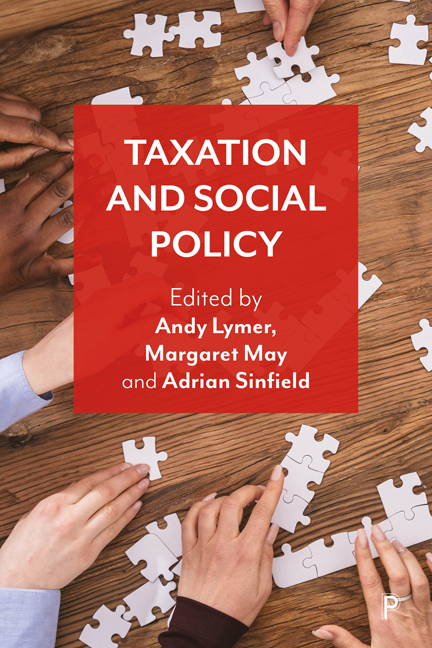Book contents
- Frontmatter
- Contents
- List of figures and tables
- List of abbreviations
- Notes on contributors
- Acknowledgements
- 1 Introduction: The case for considering taxation and social policy togethe
- 2 Fiscal and social policy: two sides of the same coin
- 3 Tax and the social policy landscape
- 4 Fiscal welfare and tax expenditures
- 5 Employment, self-employment and taxation
- 6 Pensions and taxation
- 7 Tax, benefits and household income
- 8 Taxation, health and social care
- 9 Homes, housing and taxation
- 10 Wealth taxation: the case for reform
- 11 Gender and taxation
- 12 Taxation and local taxes
- 13 Corporate tax and corporate welfare
- 14 The climate crisis and taxation
- 15 Conclusions: Taxation in a social policy context
- Index
11 - Gender and taxation
Published online by Cambridge University Press: 20 January 2024
- Frontmatter
- Contents
- List of figures and tables
- List of abbreviations
- Notes on contributors
- Acknowledgements
- 1 Introduction: The case for considering taxation and social policy togethe
- 2 Fiscal and social policy: two sides of the same coin
- 3 Tax and the social policy landscape
- 4 Fiscal welfare and tax expenditures
- 5 Employment, self-employment and taxation
- 6 Pensions and taxation
- 7 Tax, benefits and household income
- 8 Taxation, health and social care
- 9 Homes, housing and taxation
- 10 Wealth taxation: the case for reform
- 11 Gender and taxation
- 12 Taxation and local taxes
- 13 Corporate tax and corporate welfare
- 14 The climate crisis and taxation
- 15 Conclusions: Taxation in a social policy context
- Index
Summary
Introduction
That social policies have gender-differentiated impacts has long been commented on. But recognition that the same was true of taxation came only in the late 1980s with the beginnings of the Gender Responsive Budgeting (GRB) movement. This chapter will outline how since then attention has moved from challenging gender inequality within taxation itself to examining how the tax system works to increase or decrease gender inequalities in society. After a brief look at independent taxation, the defining gender issue when Taxation and Social Policy was published in 1980, the next two sections introduce GRB, first as an international movement, and then as manifested in the UK. GRB's main principles are then outlined, before being applied successively to the societal functions of tax and some specific taxes.
Independent taxation
UK social policy has long been criticised for erroneously assuming and thus reinforcing a male breadwinner model of the family in which women were primarily treated as dependants. That same assumption lay behind the joint taxation of married couples, whereby the income of a married woman was added to the income of her husband and taxed as if it was his, with all tax allowances given to him. By the 1980s, that system was beginning to creak: it was recognised that many married women were earning, but the Wife's Earned Income Allowance still went to the husband. Campaigns such as ‘Why be a wife?’ and for the ‘Legal and financial independence of all women’ fought for independent, that is, individual, taxation.
Independent taxation was finally enacted in 1990, though some hangovers such as the Married Couple's Allowance still remain for older couples, and two recent changes have undermined its principle. Since 2015– 16, a lower or non-earning spouse or civil partner has been allowed to transfer some of their personal allowance to their basic-rate taxpaying spouse or civil partner. This has small similar effects to joint taxation: discouraging the lower-earner's employment while reducing the tax paid by the higher earner.
- Type
- Chapter
- Information
- Taxation and Social Policy , pp. 182 - 201Publisher: Bristol University PressPrint publication year: 2023



